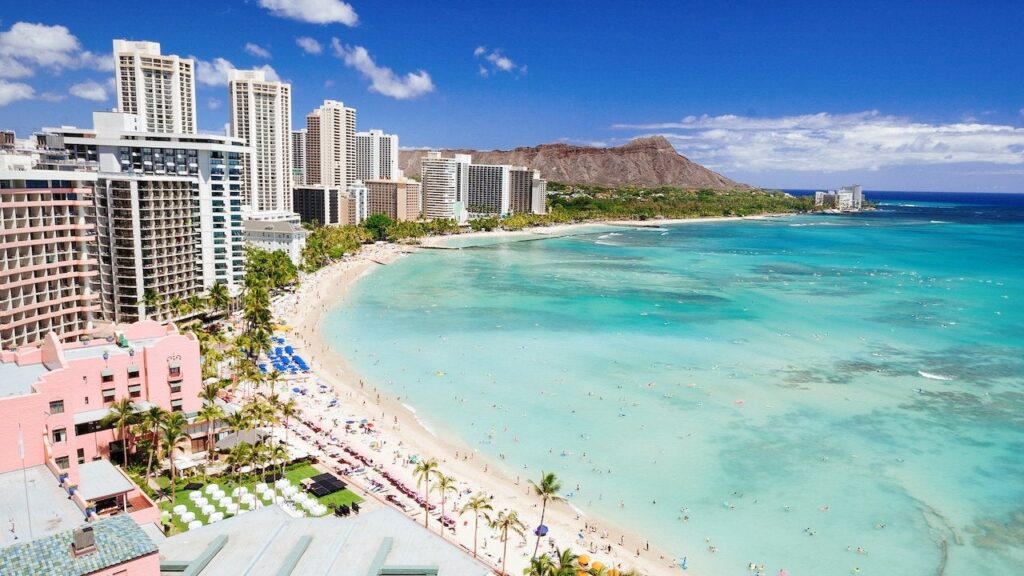
Picture yourself waking up to the sound of ocean waves, stepping outside to year-round sunshine, and being surrounded by some of the world’s most breathtaking natural beauty. For many Americans, Hawaii is the ultimate dream destination, but paradise comes with a price.
Beyond the postcard-perfect views lie real challenges: sky-high living costs, limited housing, and the complex realities of life on an island. Let’s explore the state’s cost of living and housing market trends to help you decade if paradise is truly within reach.
What Makes the Aloha State So Appealing?
Hawaii’s appeal goes beyond the views. Its year-round sunshine, averaging 75°F to 85°F, means no snowstorms or heavy winter coats. From volcanic craters and lush rainforests to world-renowned beaches, Hawaii’s landscapes are as diverse as they are stunning. Whether you’re hiking Kauai’s Na Pali Coast, watching a sunrise from Maui’s Haleakalā Crater, or sipping coffee with a view of Diamond Head, Hawaii’s scenery never gets old.
The state’s unique cultural blend of Native Hawaiian traditions, Asian influences, and Western customs creates a one-of-a-kind community and lifestyle. The “Aloha Spirit,” rooted in kindness and respect, is more than just a slogan, it’s a way of life. For outdoor enthusiasts, the islands are a playground, offering everything from world-class surfing on Oahu’s North Shore to snorkeling in crystal-clear waters. So, it’s easy to stay active and adventurous year-round.
What is the Cost of Living in Hawaii?
The state’s natural beauty is undeniable, but the cost of living in Hawaii is significantly higher than on the mainland. With soaring housing prices, high utility bills, and everyday goods costing more due to its remote location, you’ll need a hefty income to maintain a comfortable lifestyle.
- Cost of Living: Hawaii’s living costs are 82% higher than the US average, making it the most expensive state in America. This high cost impacts everything from groceries to healthcare, influencing residents’ overall budget.
- Housing: The state’s median home price is $739,600. Limited land availability and high demand continue to push prices upward, especially in popular areas like Oʻahu and Maui.
- Utilities: The average electricity bill is $160 to $400 per month, the highest in the US. Hawaii relies heavily on imported fossil fuels, which contributes to these elevated utility prices. However, solar and energy-efficient homes can reduce costs somewhat.
- Daily Expenses: Food and household goods are 15% to 30% more expensive than on the mainland. Furthermore, gas prices vary by island. Shipping and transportation costs play a major role in the inflated prices of everyday items.
- Income Requirements: Aim for an annual household income of $125,000. This will help you offset the high expenses and maintain a comfortable lifestyle in the islands.
Where Are the Most Affordable Places to Live in Hawaii?
Despite Hawaii’s reputation for sky-high costs, you can find affordable options beyond expensive resort areas. To get a clearer picture of what you can afford, use Hawaii’s mortgage calculator on Houzeo, America’s best home buying website, to estimate your monthly payments and plan your budget.
Big Island: The Best Values
● Mountain View:
- Median Sale Price: $205,000
- Annual Appreciation Rate: -31.8%
- Average Days on Market: 80
- Secluded and budget-friendly; ideal for buyers seeking peace, space, or a remote getaway at one of Hawaii’s lowest price points.
○ Pahoa:
- Median Sale Price: $325,000
- Annual Appreciation Rate: -8.5%
- Average Days on Market: 84
- Features: Affordable entry into island life; great for first-time buyers or investors looking for negotiation leverage in a quiet market.
○ Hilo:
- Median Sale Price: $550,000
- Annual Appreciation Rate:8%
- Average Days on Market: 64
- Features: A balance of urban amenities and island charm; perfect for families or buyers wanting strong infrastructure and appreciation potential.
● Oahu: Balancing Cost and Convenience
○ Waianae:
- Median Sale Price: $690,000
- Annual Appreciation Rate: 46%
- Average Days on Market: 46
- Features: Ocean views without the resort premium; ideal for buyers prioritizing beach access and long-term growth in a more relaxed setting.
○ Ewa Beach:
- Median Sale Price: $830,000
- Annual Appreciation Rate:2%
- Average Days on Market: 88
- Features: Popular with families; newer homes, strong schools, and community feel in one of Oahu’s fastest-growing areas.
○ Wahiawa:
- Median Sale Price: $782,500
- Annual Appreciation Rate:6%
- Average Days on Market: 71
- Features: Scenic, centrally located, and full of potential; great for buyers open to renovating and adding value over time.
Who Should Consider Moving to Hawaii?
Hawaii isn’t for everyone. While the islands offer a unique lifestyle and breathtaking environment, they also come with specific financial, professional, and cultural trade-offs. It’s crucial to know whether it aligns with your lifestyle and priorities before you make the leap.
✅ Who Thrives in Hawaii
1. Retirees with Financial Security
- Retirees benefit from excellent healthcare, and the nation’s highest life expectancy (81.6 years).
- Stable retirement income can comfortably support the higher cost of living.
- Daily access to natural beauty and outdoor activities enhances quality of life.
2. Remote Workers with Mainland Salaries
- Remote workers can enjoy island living while earning competitive mainland wages.
- A reliable internet infrastructure supports remote work across most islands.
- The time zone difference may require early starts, but allows for more free time in the afternoon.
3. Outdoor Enthusiasts
- Hawaii offers year-round access to surfing, snorkeling, and other outdoor activities.
- A mild climate and diverse terrain support an active, outdoor-focused lifestyle.
- Access to nature is immediate and immersive, not just reserved for weekends.
4. Those Seeking a Mindful, Slower Lifestyle
- Hawaii’s pace of life promotes mindfulness, community, and connection to nature.
- Island culture encourages sustainability, simplicity, and work-life balance.
- It’s ideal for those looking to unplug from fast-paced, high-pressure environments.
⚠️ Who May Struggle in Hawaii
1. Career-Driven Professionals in Certain Fields
- Professionals in finance, tech, or manufacturing may face limited job growth and advancement.
- The local job market is smaller and less diverse than major mainland cities.
- Networking and industry events are fewer and less specialized.
2. Young Professionals Just Starting Out
- Entry-level wages often don’t align with the state’s high cost of living.
- Fewer opportunities exist for internships, mentorships, and career development.
- Building savings and career momentum may be easier on the mainland.
3. Big-City Lifestyle Seekers
- Hawaii lacks the scale, nightlife, and public transportation found in large urban centers.
- While culturally rich, it may feel too small or quiet for those craving non-stop activity.
- There’s limited access to global events, major sports, or world-class museums.
4. Individuals with Specialized Needs
- Specialized medical care can be limited, especially on the neighbor islands.
- Access to elite educational institutions or niche business services may be restricted.
- Frequent travel to the mainland may be necessary for healthcare, education, or work.
What Should Homebuyers Consider Before Moving to Hawaii?
Successfully relocating to Hawaii requires thorough planning, realistic expectations, and respect for local culture. The key is approaching the move with proper preparation rather than romantic notions of paradise.
- Market Strategy and Timing: Right now, market conditions are more favorable for buyers, with more inventory, longer days on market, and less competition. Work with local agents who understand island-specific risks like flood zones, lava areas, and community dynamics.
- Cultural Integration and Respect: Learn about Native Hawaiian history, language, and traditions before moving, and use proper pronunciation for place names to show respect. The “Aloha Spirit” reflects values like kindness, humility, and care for the land. Approach the move with humility and openness to earn trust and integrate into the community.
- Practical Preparation: Consider renting first to see if island life is for you. Research each community carefully, as neighborhoods vary in climate, lifestyle, and amenities. Plan your finances with higher costs in mind, and keep a larger emergency fund to handle the state’s limited access to goods and services.
For those who can afford it and embrace the island lifestyle, Hawaii offers an unparalleled quality of life. The key is approaching the move with careful preparation, cultural respect, and understanding that paradise comes with its own distinct challenges and extraordinary rewards.
👉 Is the Aloha State calling your name? Browse homes for sale in Hawaii from your phone. You can compare trends, shortlist top picks, and submit offers using Houzeo, America’s best real estate app. Download it for free from the App Store or the Google Play Store today.







